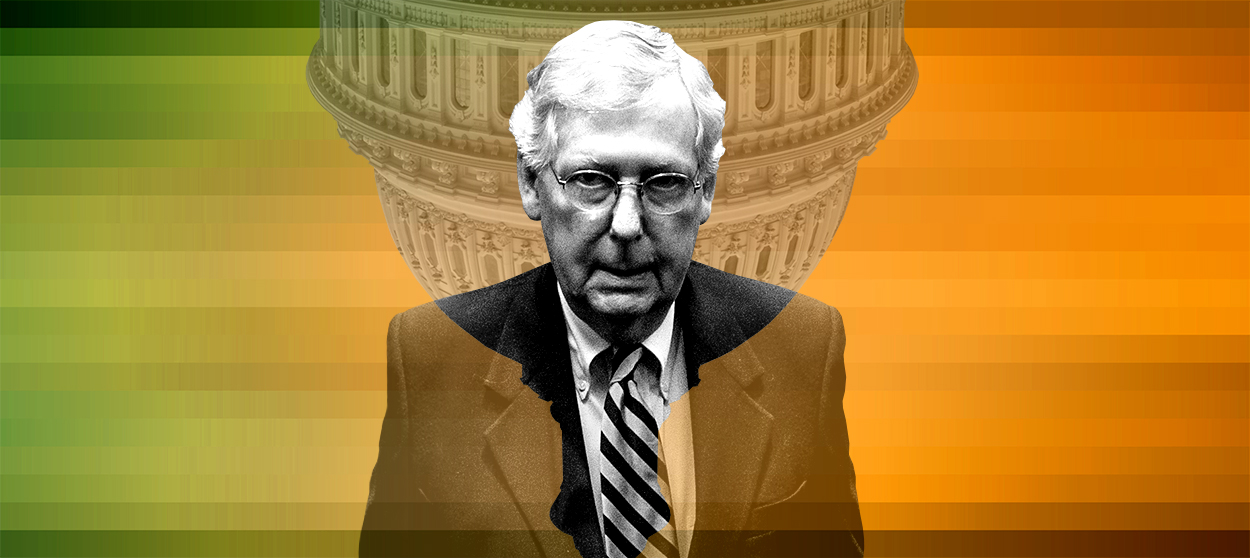Kill the filibuster
Mitch McConnell is shamelessly hacking away at what's left of the filibuster. That's a good thing in the long term.


A free daily email with the biggest news stories of the day – and the best features from TheWeek.com
You are now subscribed
Your newsletter sign-up was successful
You almost have to admire the ostentatious shamelessness of Senate Majority Leader Mitch McConnell (R-Ky.). First, the man refused to grant a committee hearing or a vote for Merrick Garland, former President Obama's nominee to replace the late Justice Antonin Scalia on the Supreme Court. Now he has the gall to decry Democratic "obstructionism" and attempt to change Senate rules to make it easier — much easier — to confirm President Trump's executive branch appointees who might otherwise find their nominations stalled by the minority party.
"Since January 2017, for the first time in memory, a minority has exploited procedure to systematically obstruct a president from staffing up his administration," McConnell sniffed in a Politico op-ed.
His memory is terribly — and conveniently — short. The filibuster has been knocking on death's door for years now, in part because of McConnell's own history of obstructionism.
The Week
Escape your echo chamber. Get the facts behind the news, plus analysis from multiple perspectives.

Sign up for The Week's Free Newsletters
From our morning news briefing to a weekly Good News Newsletter, get the best of The Week delivered directly to your inbox.
From our morning news briefing to a weekly Good News Newsletter, get the best of The Week delivered directly to your inbox.
The filibuster is a feature of the Senate's tradition of unlimited debate: Final votes on legislation and appointments aren't taken if there's one member willing to argue an issue. That is, unless 60 senators vote for "cloture" to shut down debate.
Back in 2011, though, then-Senate Majority Leader Harry Reid (D-Nev.) invoked the "nuclear option" to change Senate rules, making it easier to end some filibusters in order to confirm Obama's executive branch appointees — to hundreds of federal agency jobs and government board seats — because Republicans were filibustering those appointees at unprecedented rates.
"I think it's a time to be sad about what's been done to the United States Senate," said McConnell, then the minority leader. Back then, weakening a minority party's ability to gum up the legislative works was an offense against sacred principle. Now? Weakening the majority party's ability to override the opposition is similarly noble.
It's pointless to accuse McConnell of hypocrisy — he obviously doesn't care. Besides, he is perfectly consistent in his actions: He does whatever serves the GOP's needs in the moment.
A free daily email with the biggest news stories of the day – and the best features from TheWeek.com
That said, let's be honest: Filibuster politics can make hypocrites of us all. You could scrape together a majority just by making a caucus of every Senate member who had ever been for filibusters while in the minority and against them while in the majority. You could probably also put together a decent op-ed page of columnists and pundits who have similarly flip-flopped.
I think McConnell is acting — as is often the case — in bad faith, and Trump's nominees will be predictably awful. But I also don't care: It's good that McConnell is leading the way to weaken the filibuster. The only problem is that Democrats and Republicans are killing it with an endless series of half-measures: Reid's nuclear option made it possible to approve nominees on a simple majority vote, instead of requiring a supermajority; the newer change cuts the Senate's total debate time per nominee from 30 hours to two.
Enough. It's time to kill the beast entirely.
We've all been taught in civics class about the virtues of the Constitution's "checks and balances" design, but the Founders went a little overboard in designing the legislative branch. On most legislation, the House and Senate don't just check and balance the executive and judicial branches: They check and balance each other. The filibuster — a Senate rule, by the way, that's not required by the Constitution — adds yet another opportunity to thwart legislative action. The Senate ends up checking and balancing itself.
It's too much.
If you're a Democrat who loathes Trump, anything that slows progress in the GOP-led Senate might seem like a good thing, for the moment at least. But liberals should favor the death of the filibuster even though Republicans are running the show in the White House and Senate. Democrats, I'm optimistic, will get their turn soon enough.
If you're a fan of old movies, the filibuster might even seem noble. In truth, the filibuster has probably been used to obstruct more good legislation — everything from civil rights bills in the 1950s to immigration reform in recent years — than it has to thwart bad legislation. And because it often requires a Senate supermajority to get things done, it goes against that most basic element of democracy: Majority rules.
Sometimes, that majority is going to be the party you don't like. That's just the way democracy works.
So to be clear: It's time to get rid of the filibuster for everybody. Yes, there will be some pain involved for minority party senators, both now and in the future. Trump may benefit for the moment, but the next Democratic president will be happy it's gone, and so will the next Democratic majority in the Senate. By further weakening the rules that let the minority party block a president, McConnell just did a good thing in flagrantly bad faith. I hope it's not long before Democrats can make him regret it.
Joel Mathis is a writer with 30 years of newspaper and online journalism experience. His work also regularly appears in National Geographic and The Kansas City Star. His awards include best online commentary at the Online News Association and (twice) at the City and Regional Magazine Association.
